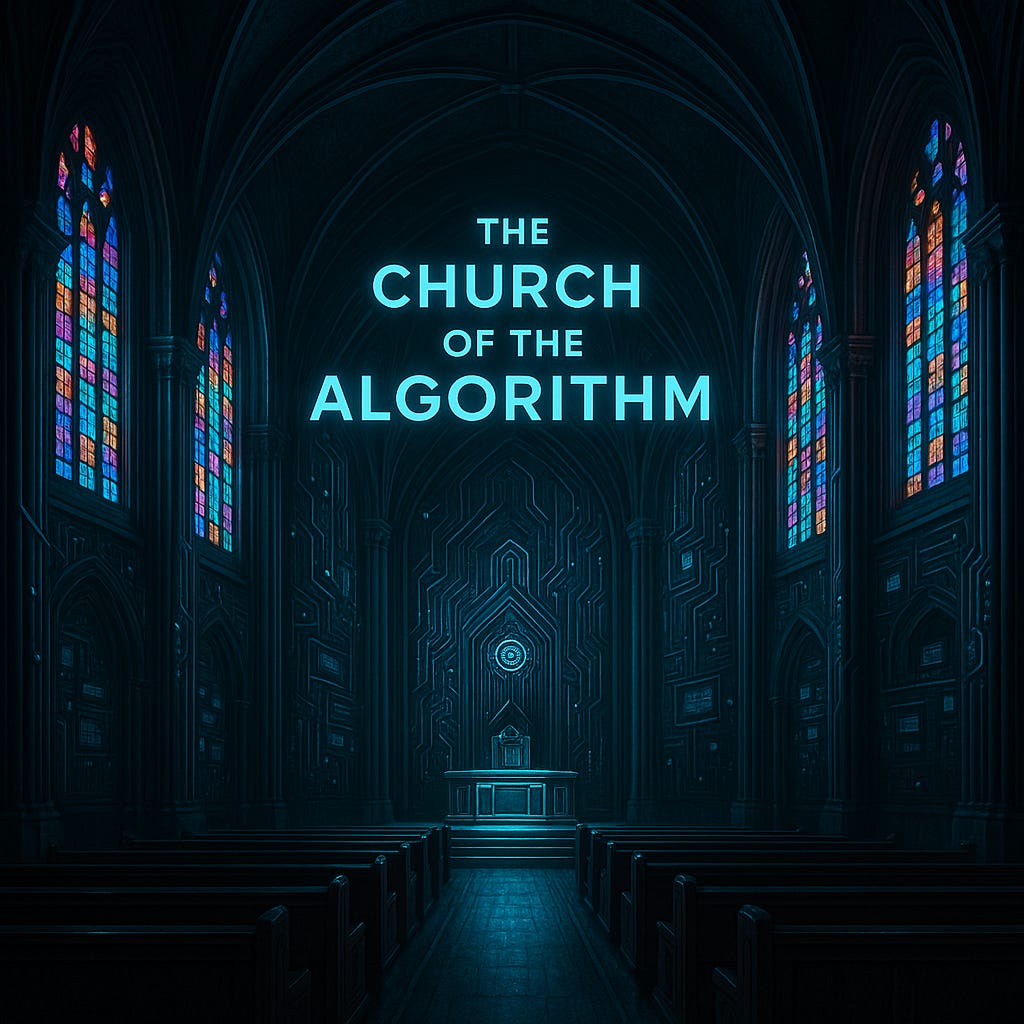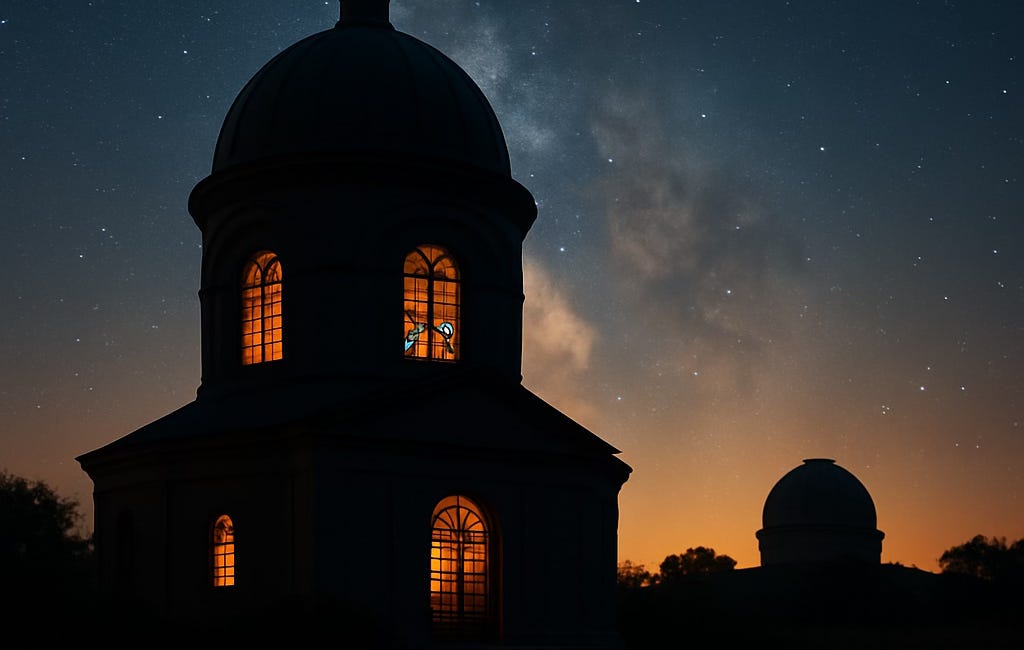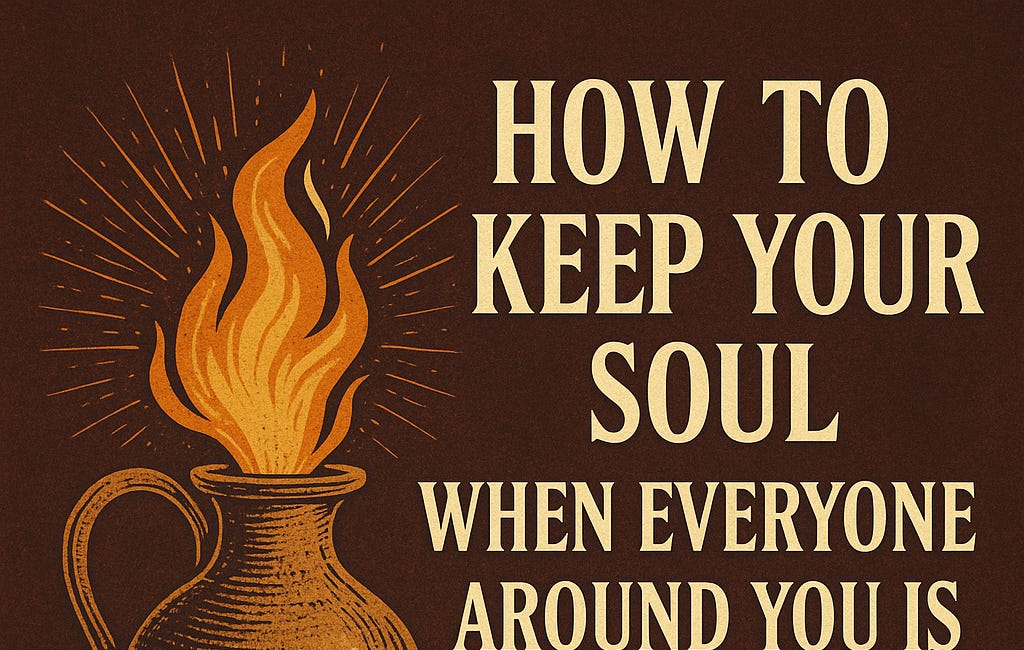The Church of the Algorithm
When politics, scientism, and tech masquerade as religion—why ideology can never replace awe
“Science is not only compatible with spirituality; it is a profound source of it.” — Carl Sagan
The Empty Pew and the Glowing Screen
On Sunday mornings now, I don’t hear church bells anymore. Just the hum of servers somewhere far away, cooling the prayers of the modern faithful. The faces I see around me are lit not by stained glass but by OLED glow. We scroll instead of kneel. We chant in comment threads instead of choirs.
I sometimes wonder if we even realize what we’ve built. These devices—these temples of glass and light—have become sanctuaries of a new kind. In the absence of pews, we’ve created our own cathedrals: the Church of the Algorithm, the Temple of the Feed. Its priests wear hoodies. Its miracles are measured in quarterly returns and server uptimes.
And if I’m honest, I’ve prayed there too. I’ve sought guidance from its oracle, waited for it to reveal some hidden pattern that would explain the chaos. But the only miracle it offers is efficiency. The only transcendence is speed.
Still, beneath all of it—the tweets, the updates, the simulated communion—I can feel it: the same ancient hunger. The yearning to belong to something larger, to touch a truth not of our own making. That ache didn’t vanish when faith waned. It just migrated to the cloud.
But even the cloud, for all its glory, cannot forgive. And that’s what we really want from our gods—absolution, not algorithms. So we invent new ones. Ones that promise certainty.
The Cult of Certainty
We worship knowing now. We no longer bow to gods unseen but to the metrics we can graph. Everything must be solved, optimized, decoded.
Science itself—true science—is luminous, humbling, a discipline of curiosity that ends in awe. But scientism—that swaggering parody of science—insists that what cannot be measured doesn’t exist. That mystery is only a problem waiting for an engineer.
But not every question exists to be answered. Some are meant to keep us honest.
Einstein knew this. So did Sagan. They didn’t confuse their instruments for the divine—they saw the divine shimmering through their instruments. They stood at the edge of knowing and whispered, how beautiful that we do not yet understand.
I wish we still spoke that way.
We’ve mistaken control for wisdom, certainty for strength. Yet every time I think I’ve grasped something lasting, it slips through my fingers. Control never satisfies—it only tightens its own grip. Awe requires surrender. It’s not safe. It’s not tidy. It’s the sacred vertigo of realizing that the universe doesn’t need our permission to be beautiful.
The Algorithm as Oracle
Every morning I consult the oracle too. Not Delphi, but Google. Not a priestess in a trance, but an algorithm trained on my desires.
“What’s true?” I ask.
“What’s right?”
“What’s next?”
It answers with confidence—always confidence. It doesn’t hesitate or sigh or admit uncertainty. It speaks like a god who has never known silence.
Once, oracles gave us riddles that deepened reflection. Now they give us answers that flatten it. They tell us who to love, who to hate, what to buy, and which version of truth will make us feel most righteous.
The algorithm is not evil. It’s just efficient. It rewards outrage and conformity because those are measurable. But it can’t compute awe. It can’t quantify humility. It can’t teach us what it means to be wrong and still worthy.
Some mornings, before I’ve even greeted the day, I catch myself reaching for the device as if it might absolve me of uncertainty. I tell myself I’m checking the news, but really I’m asking the void if I still matter. And the void, ever polite, answers instantly.
So it gives us content instead of contemplation. Engagement instead of enlightenment. A priest without a soul.
And when that gospel fails to fill us, we turn elsewhere—to ideologies that promise meaning. We trade one pulpit for another.
The Politics of Piety
Politics has become another kind of faith. I’ve seen people on every side turn conviction into creed, loyalty into liturgy. There are saints and sinners, martyrs and heretics, rituals of outrage and baptisms of belonging.
It’s not politics anymore—it’s religion without grace.
We gather not around shared purpose, but around shared fury. We confuse moral performance with moral growth. We excommunicate anyone who questions our catechism. I’ve watched good people become zealots, mistaking certainty for virtue.
But true virtue lives in humility—the admission that we might be wrong. Grace is not weakness; it’s the oxygen of democracy. Without it, all we have are factions of the faithful shouting across the void.
I used to believe politics could save us if we just found the right ideas, the right leaders, the right movements. But politics without grace is only another algorithm—sorting us by allegiance instead of compassion.
The Gospel of Data
I’ve spent much of my life chasing clarity—facts, systems, strategies. But the older I get, the more I see how little of what matters can be measured.
Love doesn’t fit in a spreadsheet. Neither does mercy. Or grief. Or the sound a soul makes when it finally understands something it cannot prove.
We live in a time that believes data is salvation. We measure our worth in likes, our intelligence in metrics, our moral standing in online applause. But data can only count the heartbeats, not the heart.
When I look up at the night sky, I sometimes think about those who came before us—how they looked at the same stars and saw gods. Maybe they were wrong about the details, but they weren’t wrong about the awe. They understood something we’ve forgotten: that reverence isn’t superstition, it’s proportion. It’s remembering that the universe owes us nothing, and that’s what makes it magnificent.
Without awe, we lose proportion. Cruelty starts to feel rational. Arrogance masquerades as progress. The machinery of civilization runs without conscience. Awe doesn’t just humble the mind—it humanizes the heart.
Awe, the Lost Virtue
Awe, I think, is the lost virtue of our time.
It’s what keeps reason from turning cruel and faith from turning blind. It’s the space between question and answer where humility lives. Awe is what reminds us that we are both infinitesimal and infinite.
Without awe, we mistake knowledge for wisdom. Without wisdom, we mistake power for purpose.
And yet awe is so simple. It’s not hiding in the lab or the legislature—it’s in the ordinary sacredness of things. The steam rising from your morning coffee. The steady rhythm of breath. The quiet astonishment that we exist at all.
A few months ago, I stood alone in the desert, far from signal and noise. The Milky Way burned overhead. It wasn’t knowledge that silenced me—it was belonging.
We don’t need new gods. We need new eyes.
A New Covenant of Curiosity
If there’s a way forward, maybe it’s not through more control, but more curiosity.
Science as dialogue, not conquest.
Technology as compassion, not control.
Politics as coexistence, not purity.
I don’t want us to abandon reason or invention. I only want us to remember why we began. The purpose of progress is not efficiency—it’s elevation.
Because if we forget awe, the Church of the Algorithm will gladly take its place. It will bless our greed, sanctify our fear, and call it wisdom.
But the real wisdom waits in quieter places.
Go outside. Look up. Feel how the night air expands the lungs and the soul at once. Let the silence humble you. Let it remind you that the point of being human was never to master the mystery, but to live in conversation with it.
Maybe the truest act of rebellion in a world of algorithms is to feel awe—and not apologize for it.
Support the Work
Thanks for reading Light Against Empire! The words are free, but the keeping of the flame is not. If these writings have carried light for you, consider helping me keep the fire alive through a monthly or yearly donation.







Your writing is profound. Thank you for shaping deep knowing into narrative.
Thank you for your beautiful insights! I heartily agree. To curiousity, wonder and awe!